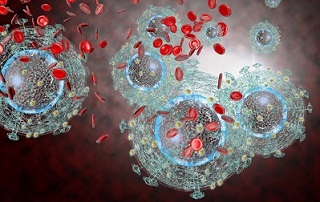BREAKING NEWS! U.S. NIH Study Finds That Those With Long COVID Neurological Symptoms Have Lower Levels Of CD4 And CD8 T-Cells!
Long COVID - Lower Levels Of CD4 And CD8 T-Cells May 07, 2023 1 year, 11 months, 1 week, 6 days, 14 hours, 24 minutes ago
Long COVID: A groundbreaking study by the U.S. National Institutes of Health (NIH) has found that most individuals suffering from Long COVID neurological symptoms have lower levels of CD4+ and CD8+ T cells. These crucial immune cells are responsible for coordinating the immune system's response to viruses. This discovery proves that SARS-CoV-2 triggers immune dysfunction and even induces immunodeficiency conditions which can cause other long-term health and medical issues. The study findings could lead to better diagnoses and innovative treatments for Long COVID, providing hope for millions of sufferers worldwide.
 Long COVID
Long COVID, also known as post-acute sequelae of COVID-19 (PASC), has a wide range of symptoms, including fatigue, shortness of breath, fever, headaches, sleep disturbances, and cognitive impairment, also known as "brain fog." These debilitating symptoms can persist for months or even years after an initial SARS-CoV-2 infection, significantly impacting sufferers' quality of life.
To gain deeper insight into the mechanisms behind Long COVID, the U.S. NIH researchers employed a method called deep phenotyping to closely examine the clinical and biological features of the condition in 12 individuals with long-lasting, disabling neurological symptoms. The study participants, who mostly experienced mild symptoms during the acute phase of their infection, underwent comprehensive testing at the NIH Clinical Center.
The study findings of this extensive examination revealed that Long COVID patients had lower levels of CD4+ and CD8+ T cells compared to healthy controls. In addition, researchers observed increases in B cells and other immune cells, suggesting that immune dysregulation may play a role in the development and persistence of Long COVID.
The study also found that individuals with Long COVID had problems with their autonomic nervous system, which controls unconscious body functions such as breathing, heart rate, and blood pressure. Autonomic testing showed abnormalities in the control of vascular tone, heart rate, and blood pressure when participants changed their posture. Further research is needed to determine if these changes are related to fatigue, cognitive difficulties, and other lingering symptoms.
These study findings contribute to the growing body of evidence suggesting that widespread immunological and autonomic nervous system changes may underlie Long COVID. The results may help researchers better understand the condition and explore potential therapeutic strategies, such as immunotherapy.
The comprehensive analysis of this small group of patients with neuro-PASC (neurologic postacute sequelae of SARS-CoV-2 infection) highlights a disabling but difficult-to-characterize syndrome that can develop even after relatively mild COVID-19 infections.
While a common feature among many of these patients is memory impairment, detailed cerebrospinal fluid (CSF) analysis revealed immunological abnormalities.
This study is significant because of its research-based evaluation of a relatively homogeneous cohort, including advanced spinal fluid analysis, imaging, and autonomic testing. The results may guide researchers in pursuing fu
rther characterization of neuro-PASC, as the natural history and potential subtypes of the syndrome are yet to be defined.
The preliminary study findings, which suggest broad immune dysregulation in the CSF, call for further investigation and evaluation of potential immunomodulatory agents to decrease the enormous public health burden of Long COVID. As more research is conducted, there is hope for a better understanding of the condition and the development of effective treatments to improve the lives of those suffering from this debilitating syndrome.
The findings were published in the peer reviewed journal: Neurology: Neuroimmunology & Neuroinflammation.
https://nn.neurology.org/content/10/4/e200097
For the latest on
Long COVID, keep on logging to Thailand Medical News.
